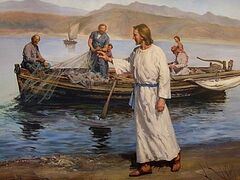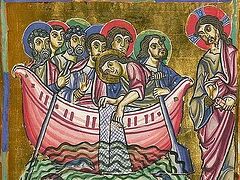 Duccio di Buoninsegna. The Calling of the Apostles Peter and Andrew (from the Maestà) c. 1308–1311.
Duccio di Buoninsegna. The Calling of the Apostles Peter and Andrew (from the Maestà) c. 1308–1311.
And saw two ships standing by the lake: but the fishermen were gone out of them, and were washing their nets. And he entered into one of the ships, which was Simon's, and prayed him that he would thrust out a little from the land. And he sat down, and taught the people out of the ship. Now when he had left speaking, he said unto Simon, Launch out into the deep, and let down your nets for a draught. And Simon answering said unto him, Master, we have toiled all the night, and have taken nothing: nevertheless at thy word I will let down the net. And when they had this done, they inclosed a great multitude of fishes: and their net brake. And they beckoned unto their partners, which were in the other ship, that they should come and help them. And they came, and filled both the ships, so that they began to sink. When Simon Peter saw it, he fell down at Jesus' knees, saying, Depart from me; for I am a sinful man, O Lord. For he was astonished, and all that were with him, at the draught of the fishes which they had taken: And so was also James, and John, the sons of Zebedee, which were partners with Simon. And Jesus said unto Simon, Fear not; from henceforth thou shalt catch men. And when they had brought their ships to land, they forsook all, and followed him.
Three evangelists tell us about the calling of the first apostles: Matthew, Mark, and Luke; the first two speak of it briefly, as if simply stating the fact of this calling, while St. Luke speaks of it in more detail, describing the miraculous catch of fish that preceded this calling. As the evangelist John tells us, the Lord was followed to the Jordan by the first disciples He noted, Andrew and John, and then to the Lord came Simon, Phillip, and Nathaniel. But having returned with Jesus to Galilee, they returned little-by-little to their former occupations—catching fish. Now the Lord calls them to follow Him constantly, commanding them to leave off catching fish and dedicate themselves to another labor—catching people for the Kingdom of Heaven.
Rumors of the coming of the Messiah quickly spread around Galilee, and crowds of people came to hear His teaching. All were pressing around Him, and then one day, when He was on the shores of Lake Gennesaret, which was at the time called a sea (probably because of the fierce storms that would come upon it), He had to get into a boat in order to sail a little distance away from the people. After finishing His teaching, the Lord charged Simon, whose boat it was, to sail out into deeper waters and cast his net. An experienced fisherman, who had labored all night unsuccessfully, was sure that a new catch would likewise be unsuccessful; but there happened such a miraculous catch that the nets even broke. Peter and Andrew had to call on their comrades James and John in another boat to help them pull up the draught of fish. There turned out to be so many fish that the two boats filled with them began to sink. Seized with reverent fear, Peter fell at Jesus’s feet, saying, Depart from me; for I am a sinful man, O Lord! In these words he wanted to express the awareness of his unworthiness before the grandeur and mightiness of the Miracle Worker. The Lord calms Peter with a word of meekness and foretells to him his future lofty calling. According to the testimony of the evangelists Matthew and Mark, the Lord said to both brothers, Peter and Andrew: “Follow Me, and I will make you fishers of men!” and then he likewise called two other brothers, James and John, to follow Him. Leaving their nets, the latter two leaving also their father, they followed after Christ.



